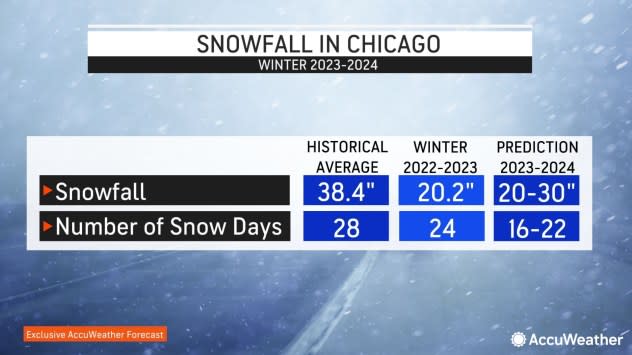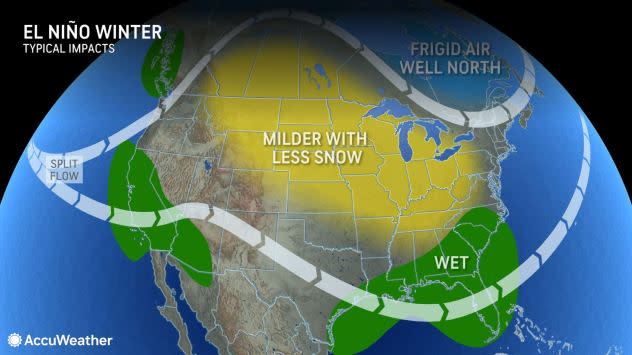Chicago winter forecast for the 2023-24 season
The days are becoming shorter and winter is right around the corner, and for people in Chicago, the upcoming seasons will have some similarities to what unfolded last winter.
Meteorological winter starts on Friday, Dec. 1, followed by the beginning of astronomical winter a few weeks later on the solstice. This year, the solstice occurs at 9:27 p.m. CST on Thursday, Dec. 21, the latest start to the season since 2019.
• Arctic air funneled into Chicago shortly after the start of winter, causing the mercury to drop below zero and remain there for more than 24 hours. The high temperature on Dec. 23, 2023, was 1 degree F below zero, followed by a low temperature of 8 degrees F below zero, the lowest temperature reading in the city since Jan. 31, 2019. Additionally, the AccuWeather RealFeel® Temperature was 43 degrees below zero during the daytime on Dec. 23.
• Despite the early arrival of cold air, it was one of the least-snowiest winters in Chicago history. Only 20.2 inches were measured throughout the season, far below the historical average of 38.4 inches. The 2023-24 season finished as the 11th least-snowiest winter in the city since reliable weather records began, dating back to the 1880s. It was also the lowest seasonal snowfall total since the 2011-12 season, when only 19.8 inches accumulated.
• "Once again, snow amounts and frequency should run below historical averages for the Midwest," AccuWeather Long-Rage Forecaster Paul Pastelok said.
• AccuWeather is predicting 20-30 inches of snow in Chicago this winter, only slightly above last year's total of 20.2 inches. Additionally, accumulating snow is forecast to fall on 16 to 22 days this winter, less frequent than last winter when measurable snow fell on 24 days.
 |
• The highest chance for accumulating snow will come during the second half of the season -- especially in February, a month Pastelok said could be "active and intense" across the United States.
• "December should be mild overall across the Midwest," Pastelok said, adding that there will be just a couple of brief chilly periods. This could carry over into January with largely mild and dry conditions across the region, including Chicago.
• In February, there is a window of opportunity for the polar vortex to dive southward across the central U.S., which may cause temperatures to tumble to their lowest levels of the season in Chicago.
 |
A man jogs during snowy day at North Avenue Beach in Chicago, Saturday, Feb. 1, 2014. (AP Photo/Nam Y. Huh) |
• Even with a downturn in temperatures in February, the season as a whole is likely to be on the mild side. AccuWeather's long-range forecasters are predicting temperatures will run between 2 and 3 degrees above the historical average in Chicago this winter, similar to last season when temperatures were 3.6 degrees Fahrenheit above the long-term averages.
• El Niño developed earlier this year and will play a big role in the weather in the Midwest throughout the winter season. El Niño is a regular climate pattern related to warm water near the equator of the eastern Pacific Ocean. This change in water temperature can reshape the jet stream and significantly influence winter weather patterns.
• Pastelok explained that El Niño usually results in less snowfall across the Great Lakes, while air temperatures tend to run above the historical averages.
 |
An El Niño pattern often ushers in an active storm track and resultant wetter conditions than the historical average across southern parts of the U.S. |
• Despite the prospects of a milder winter with below-average snowfall, skiers should still have fair to good conditions when hitting the slopes across the Midwest. Pastelok said resorts may have to rely on artificial snow rather than fresh powder from Mother Nature, but there should be enough cold air to help with the snow-making process.
Want next-level safety, ad-free? Unlock advanced, hyperlocal severe weather alerts when you subscribe to Premium+ on the AccuWeather app.AccuWeather Alerts™ are prompted by our expert meteorologists who monitor and analyze dangerous weather risks 24/7 to keep you and your family safer.




